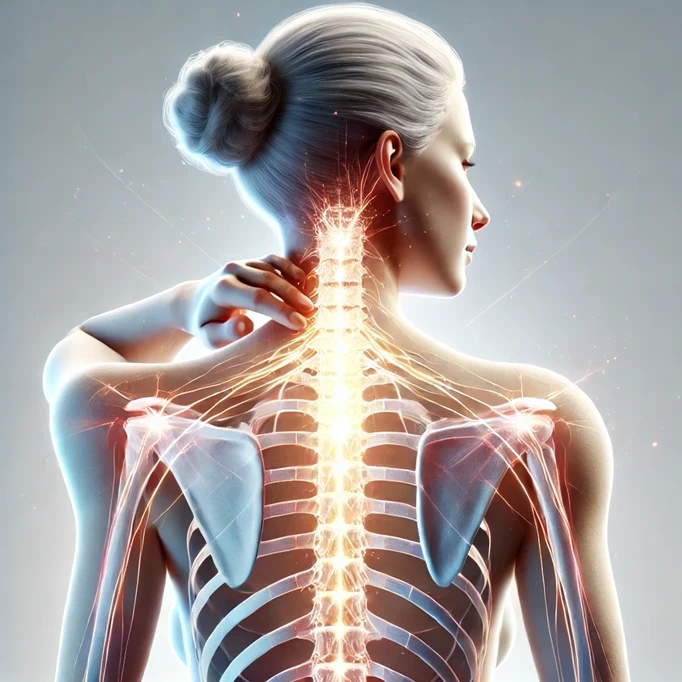
Addressing Pinched Nerves Through Upper Cervical Chiropractic Techniques
Pinched nerves can cause a wide range of uncomfortable and even debilitating symptoms—from radiating pain and numbness to tingling, burning, or muscle weakness. While many people turn to medication or even surgery for relief, a growing number are discovering a highly effective, non-invasive solution: upper cervical chiropractic care.
By downloading the Digital Patient Chart mobile app you can better control your patient portal.
At our Hiawatha IA upper cervical chiropractic clinic, we specialize in a focused, gentle approach to realigning the spine from the top down. This technique—centered around the atlas bone (C1)—helps relieve pressure on the nervous system, including pinched nerves, and restores normal communication between the brain and body.
In this article, we’ll explore what causes pinched nerves, how they affect your body, and how our advanced upper cervical techniques provide long-term relief, naturally.
What Is a Pinched Nerve?
A pinched nerve occurs when surrounding tissues—such as bones, muscles, tendons, or discs—apply too much pressure to a nerve. This compression disrupts the nerve’s function and can lead to symptoms like:
- Sharp, burning, or shooting pain
- Tingling or numbness in the arms, hands, legs, or feet
- Muscle weakness
- Stiffness or limited range of motion
- Radiating pain from the neck to the shoulders or from the lower back to the legs
Pinched nerves are most commonly found in the cervical spine (neck) and lumbar spine (lower back). However, they can affect any part of the body and often become chronic if left untreated.
Common Causes of Pinched Nerves
Pinched nerves can result from various structural or functional issues, such as:
- Bulged or herniated discs
- Spinal misalignment
- Muscle imbalances or tightness
- Bone spurs or arthritis
- Poor posture or repetitive motion injuries
- Whiplash or trauma from auto accidents
- Nerve entrapment syndromes like carpal tunnel
One of the most overlooked causes? Atlas misalignment—a small shift in the top vertebra of your spine that can create downstream effects on the entire nervous system.
The Atlas Bone: A Critical Piece of the Puzzle
The atlas (C1 vertebra) is the topmost bone in your spine. It supports the skull and surrounds the brainstem, where the nervous system begins. While it’s small, it plays a major role in postural balance and neurological function.
When the atlas shifts out of alignment—something we call atlas subluxation—it can:
- Alter your posture and spinal mechanics
- Create torque or pressure on the spinal cord
- Disrupt blood flow and cerebrospinal fluid circulation
- Increase tension and compensation in the neck, shoulders, and back
- Cause muscular compression that contributes to pinched nerve symptoms
At our Atlas Chiropractic office in Hiawatha, we focus on precisely correcting this misalignment to address the root cause of many nerve issues.
How Upper Cervical Chiropractic Techniques Help Pinched Nerves
Unlike traditional chiropractic, upper cervical chiropractic care is a specialized approach that targets the top of the spine. Our clinic uses the Advanced HIO upper cervical technique, which is:
- Gentle – no cracking, popping, or twisting
- Precise – guided by advanced imaging and thermographic scans
- Effective – designed to restore whole-body balance
Here’s how this unique method helps alleviate pinched nerves:
1. Reduces Pressure at the Source
By correcting atlas misalignment, we relieve compensatory tension throughout the spine. This reduces the mechanical stress that can irritate nerves in the cervical, thoracic, or lumbar regions.
2. Restores Neurological Communication
The spinal cord passes directly through the atlas. Realignment helps improve brainstem function and nerve flow, allowing your body to self-regulate and heal more efficiently.
3. Improves Posture and Structural Balance
Pinched nerves are often exacerbated by poor posture. Our care promotes upright head positioning, balanced shoulder alignment, and proper pelvic symmetry—all of which reduce nerve impingement over time.
4. Decreases Inflammation and Tension
Misalignment often leads to muscular guarding and inflammation. When alignment is restored, muscle tightness around the nerve eases, allowing pressure to dissipate naturally.
What to Expect at Our Hiawatha Upper Cervical Clinic
If you’re dealing with a pinched nerve, we take a comprehensive, patient-centered approach to your care:
1. Consultation and Examination
We begin with a full health history and chiropractic wellness evaluation, including neurological, orthopedic, and posture tests.
2. Tytron Infrared Thermography
This non-invasive scan shows where nerve pressure and temperature asymmetry exist—often revealing hidden patterns of stress.
3. Advanced Diagnostic Imaging
We take precise x-rays of your atlas and axis vertebrae to measure the exact nature of the misalignment.
4. Custom Atlas Adjustment
Using the knee-chest table, we perform a gentle correction tailored to your unique spinal blueprint. This adjustment often results in immediate changes to posture and muscle tone.
5. Follow-Up and Re-Scanning
We monitor your progress over time, using follow-up scans and patient feedback to track your nervous system function and symptom improvement.
Common Pinched Nerve Conditions We See
Our upper cervical chiropractor in Hiawatha works with a wide range of nerve-related issues, including:
- Pinched nerve in neck
- Pinched nerve in lower back
- Radiating pain into shoulders or arms
- Sciatica (pinched nerve in the lumbar spine)
- Carpal tunnel syndrome
- Occipital neuralgia (pain at the base of the skull)
- Thoracic outlet syndrome
- Numbness or tingling in hands or feet
- Trap pain or tight neck muscles
We’ve helped patients across Cedar Rapids, Marion, North Liberty, and beyond experience relief without the use of surgery or medication.
How Upper Cervical Chiropractic Compares to Traditional Treatments
When it comes to treating a pinched nerve, patients often cycle through a variety of options—some more invasive or temporary than others.
- Pain medications are commonly used to manage symptoms. While they may provide short-term relief, they do little to address the underlying structural or neurological cause and often come with unwanted side effects or the risk of dependency.
- Steroid injections are another frequently recommended intervention. These anti-inflammatory treatments may reduce swelling around the nerve temporarily, but the relief tends to wear off, and repeated injections can carry significant risks, especially in sensitive spinal regions.
- Surgical intervention, though sometimes necessary in severe cases, is invasive and typically recommended only after other options have failed. It involves permanently altering the spine and can lead to lengthy recovery times and mixed outcomes.
- Traditional chiropractic care focuses on adjusting multiple areas of the spine using forceful manipulations. While this can provide relief for some, it often lacks the precision needed to resolve upper cervical issues that influence the entire nervous system.
By contrast, upper cervical chiropractic care takes a uniquely gentle and focused approach. Rather than treating symptoms in isolation, it aims to correct the core misalignment at the top of the spine—specifically the atlas vertebra—to restore balance throughout the body. This non-invasive, atlas-specific technique targets the nervous system directly, promoting natural healing and long-term correction without the need for drugs or surgery.
What Patients Experience After Atlas Correction
Many patients dealing with pinched nerves begin to notice:
- Reduced tingling and numbness
- Improved grip strength or coordination
- Less radiating pain down arms or legs
- Improved range of motion
- Better posture and flexibility
- Fewer flare-ups with daily activities
This is especially true for those who combine care with improved ergonomics and posture awareness.
Why Choose Our Hiawatha IA Upper Cervical Chiropractor?
We are one of only a few chiropractic offices in Iowa specializing in Atlas-Specific chiropractic. Patients come from as far as Davenport, Muscatine, Iowa City, and Kalona because we offer:
- Non-invasive chiropractic care
- Upper cervical specific chiropractic care
- Personalized nervous system health care
- Advanced diagnostic imaging for spinal health
- Targeted care for pinched nerve and neurological conditions
Addressing Pinched Nerves Naturally and Effectively
Pinched nerves don’t have to be a lifelong sentence of discomfort or dependency on medications. By focusing on the root cause—often found in the atlas vertebra—we help restore alignment, relieve pressure, and give the body the chance to heal itself.
If you’re looking for a pinched nerve chiropractor near me, or want to explore upper cervical chiropractic techniques for nerve pain, we invite you to visit our clinic in Hiawatha IA (52233).
📍 Serving Cedar Rapids, Hiawatha, Marion, Iowa City, and Eastern Iowa
We specialize in non-surgical spine health solutions, pinched nerve relief, and upper cervical spine alignment.






Leave a comment